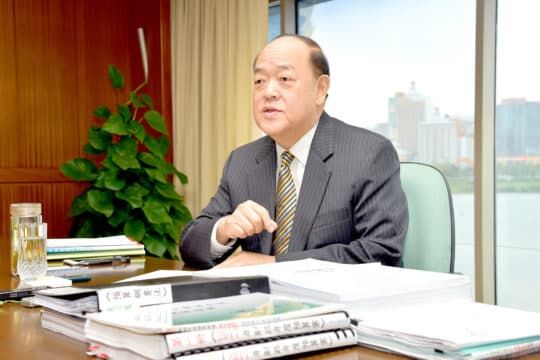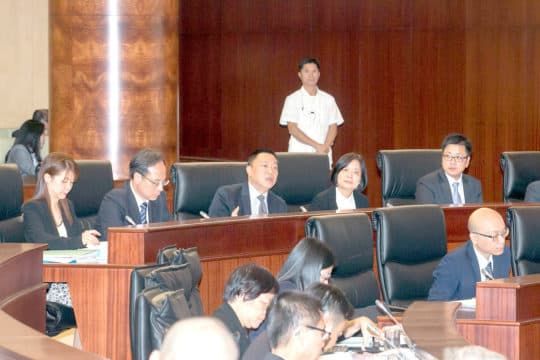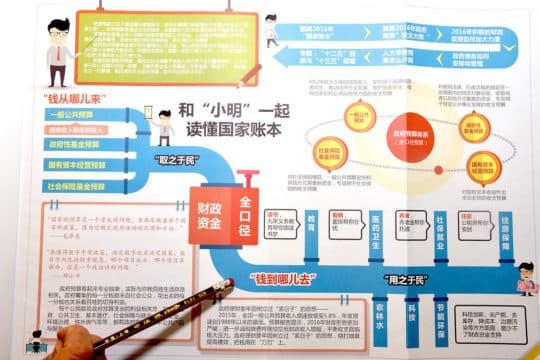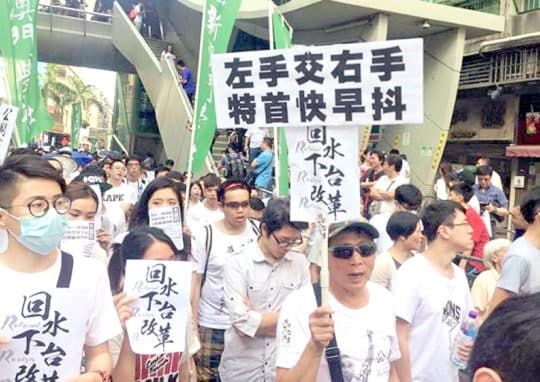First Brother of the Council: "It is a crime for you to waste public money"|An Interview with Ho Iat Seng Essence #02
This article is specially reproduced by the independent media of Macau, "On the Media". The original title is: The first brother of the new "Outline Budget Law" bill: The power of checks and balances and supervision must be returned to the Legislative Council . Recently, we have started to contribute to "The End" and launched a new subscription plan in cooperation with Patreon. At the same time, we have reprinted selected articles of "The End" on Matters, so that readers from both sides of the Taiwan Strait and four places can better understand the social issues in Macau.
Our words: This article is the second part of an exclusive interview with He Yicheng, the then Chairman of the Legislative Council and the current Chief Executive. It was during the legislative process of the Outline Budget Law. The first brother vigorously bombarded the bill for its lack of an accountability system and criticized officials from the left. Insufficient supervision of investment companies, and the right group of major foundations wash their feet without wiping their feet. Fast-forward time, investment companies and foundations have really "problems", and people are also questioning the official's inability to explain the details of epidemic prevention expenses...
The government expects revenue to fall by $300 million next year, but total spending will rise by more than $10 billion to $95.7 billion. However, numerous reports of the ICAC and the Audit Commission have revealed that the government's spending on public funds is arbitrary, chaotic and wasteful. The backward legal system and lack of supervision have opened the door to corruption and power rent-seeking.
Where have the nearly 100 billion annual budget expenditures gone, this has become a topic of great concern to the public. The public hopes that the new "Outline Budget Law" bill currently under consideration by the Legislative Council will truly embody the "sunshine government" concept of governance, allowing the public and the Legislative Council to effectively supervise the government's financial operations.
Back on track, the Legislative Council should have the power to oversee government finances
However, the President of the Legislative Council, Ho Iat-shing, admitted in an exclusive interview with "The End" that the new "Outline Budget Law" bill submitted by the government this time is not ideal, and even more "outline" than the old version. The provisions have been "shrinked" from the original 43 articles to Only 31 remain. The new bill fails to embody the powers of the Legislative Council to oversee the government's finances under Article 72(2) of the Basic Law.
"The government cannot deprive the Legislative Council of its oversight power. This is the implementation of the Basic Law. Don't let the public misunderstand the government. The government spends money indiscriminately. As long as it is clear where the money comes from and where it goes, the citizens will be at ease. He said that although Macau has an executive-led political system, the Legislative Council will definitely cooperate. After the government submits the bill, the Legislative Council will definitely help the government to revise and vote on it, but it does not mean that the Legislative Council will give up its power of supervision and checks and balances.” The power of checks and balances and oversight must be brought back to the Legislative Council."
He Yicheng, a member of the Standing Committee of the National People's Congress, has participated in the revision of the "China Budget Law" and reviewed the budget expenditure of China's population of 1.3 billion every year. He has rich experience in the government's financial supervision. Regarding the revision of the "Outline Budget Law" in Macau this time, he bluntly stated that he will personally handle it. The bill needs to be "overhauled", and the "Basic Law" must be abided by, and the power of the Legislative Council to review and supervise the government's financial audit must be implemented.

Constraining the government is to reduce the evil thoughts of some people
He said, "The more constraints on the government, the better the government should do." The oversight role of the Legislative Council is like a watchdog, "The more I (the Legislative Council) bark, the more vigilant you (the government) will be. The higher the level, the fewer mistakes officials will make. It is hard work to train officials, not something that can be done overnight. If officials are allowed to make mistakes, at most they will be caught and imprisoned, but society will lose a talent. Therefore, usually If you are vigilant and use your talents where they can be used, you will not have so many problems.”
Ho Iat Seng believes that officials in Macau who have been exposed to corruption are all "smart people". If they are vigilant, there will not be so many problems.
"Don't let them make mistakes, this is the most important issue. Our restraint is not to be picky, but to reduce the evil thoughts of some people. It is two different things if someone cares and no one cares. Just like students study, there are teachers who care and there are no teachers. Regardless, the students I teach are different, and I want to do that.”

The new "Outline Budget Law" bill is non-binding and lags behind the mainland
Since the fifth term of the Legislative Council began in October 2013, Ho Iat-shing has been urging the government to formulate a complete "Budget Law" rather than the "Outline Budget Law" since he took office as President of the Legislative Council. However, this year's Legislative Council has less than one year remaining, and even the framework of the Outline Budget Law has not yet been scrutinized.
"I have been talking to the government all day long that Macau's huge expenditures will be reverted to the budget law, but I'm not sure about it, so I have to write a 'outline', because the 'outline' has no beginning and no end, so there is no need to ask questions. There is no need for punishment.”
He pointed out that Article 1 of the General Provisions of Chapter 1 of the Mainland Budget Law is clear from the beginning: "In order to regulate government revenue and expenditure, strengthen budget constraints, strengthen budget management and supervision, establish and improve a comprehensive, standardized, open and transparent budget system to safeguard the economy For the healthy development of society, this Law is formulated in accordance with the Constitution.” It also specifies the economic, administrative responsibility, and criminal punishment policies for individuals.
However, Macau's "Outline Budget Law" has no penalties, nor does it reflect the law's ability to restrain and supervise the government's budget. Even the object of the bill is only to translate the old bill into paper.
"Frankly speaking, this bill is only a form of guidance on how to prepare budgets, how to classify budgets, etc. It is not a formal budget law, and it is not a law without a penalty mechanism. I am willing to change the word "outline", because the budget law is not like this, there must be an accountability system."
Ho Iat Seng introduced that the Mainland adopts the "full-caliber budget" model of financial budget management. That is to say, all government revenue and expenditure are brought into unified management, and there is no government revenue and expenditure outside the budget. It is an institutional framework that incorporates all types of fiscal fund revenue and expenditure into the unified management system.
Specifically, it is divided into four major parts: general public budget, government fund budget, state-owned capital operation budget, and social insurance fund budget. The most important thing is for the people to know: "Where does the money come from and where does it go."
However, the budget formulated by the Macau government is only divided into three parts, namely the general comprehensive budget, the specific agency budget, and the PIDDA (Investment and Development Expenditure Plan) budget. However, due to the lack of transparency, there are too many small treasuries and there are many loopholes. Many expenditures that use public funds cannot be reflected in the Budget.

Common expenses are sneaky, DC capital companies have to have separate accounts
Especially in Chapter 12 "Common Expenses", the estimated expenditure for this part next year is as high as about 21.75 billion yuan, accounting for almost 20% of the total expenditure, including cash-sharing schemes, medical vouchers, other subsidies, etc., while the government rents private properties The rent for office space is also covered in this chapter.
He Yicheng believes that this will affect the performance evaluation in the future, "I don't know if the expenses are used by the side department? The side department uses the most? You can't even see the problem." Therefore, the government's rent expenditure must be put back into the department's budget.
In addition, Chapter 12 also includes a “Macau Investment and Development Co., Ltd.” wholly owned by the government. So far, the government has injected capital of 2.997 billion yuan, and the government will add more than 4 billion yuan next year, making a total investment of more than 7 billion yuan. Yuan. But how is the operation of this company in fact, no one knows what business it has in the past. Therefore, Ho Iat Seng believes that Macau's future budget needs to add an additional section to reflect the above-mentioned SAR capital management projects.
During the general discussion in the Legislative Council and the vote on the budget for the next year earlier, some members suggested that the government should allocate funds from the excess reserves to inject these government-funded companies into the annual budget. Ho Iat Seng said, "On that day (Secretary for Economy and Finance) Leung Vai Tak responded that the current method of accounting in the Mainland and Macau is the same. I did not refute him at the time. The mainland is divided into four sections. The person below told you that you should take the goods on a first-served basis. In other words, the cash collection and payment system must be an expense. What are the expenses? Expenses are expenses, and investments are investments! Now that there are so many companies, they should organize their accounts, and they should submit a clear budget and expenditure to the parliament for review and oversight. Otherwise, it will take 10 billion today and another 10 billion tomorrow, what do we know?”
Ho Iat Seng emphasized that China's local state-owned capital management projects have strict regulations, and a fixed amount of capital needs to be turned over each year, and the profits earned will be calculated separately. "It's like dividends, which must be paid back." None of the wholly-owned companies in the SAR have made any profit, but regardless of profit or loss, all government-invested enterprises must be managed by the establishment of a "SAR capital account".
"For example, the Australian Investment Corporation, with a total of 4 billion yuan, should have a feasibility report, and the investment project should be reported to the parliament. If the investment is considered profitable and beneficial to Macau, it will formally apply for funding from the financial reserves. Injecting capital into this company requires a progress report every year. It doesn’t matter if you lose money, but you have to have a full account of where the money comes from and where the money goes.”
Excessive waste of foundation administrative expenses is the biggest crime
In addition, excluding the Macau Foundation, the Macau government has nearly 20 funds, and the expenditure next year will be more than 10 billion yuan. Ho Iat Seng said that only about 50-60% of the funds used by the government to set up a fund are actually used for subsidized projects, and the rest are spent on administrative expenses.
"The whole fund needs to set up a team. After the team has a team, it will rent office buildings, renovate it, renovate it, and put it all away. It's a big deal. At present, all funds are not regulated, and there is only one total number. revenue."
Ho Iat Seng pointed out that the administrative costs of many government funds are so high that they should be assessed, otherwise it will be a waste of public money. "Waste is the biggest crime. It's not that there is no crime if public money is not in your own pocket. It is a crime if you waste public money."
The Macau Foundation has always been criticized by the society as a "black-box small treasury". The public funds that can be moved every year are as high as billions of yuan. Although it is sitting on a huge amount of money, it never needs to be explained to the Legislative Council. This year's "100,000,000-year-old" incident has sparked outrage across the city. Several groups staged a march, demanding that the chief executive, Cui Sai On, who was accused of transferring benefits, should return to the water and step down. The Macau Foundation must reform the funding system.
Ho Iat Seng pointed out that the Macao Foundation belongs to 8 specific institutions, which are financially independent, and the amount of the rollover does not need to be explained. However, the nature of the Macao Foundation is different from the social security fund, pension fund, the Hong Kong Monetary Authority and other institutions, and should be the same as other funds. Where does it come from?” to submit an independent budget to the Legislative Council. "Each foundation must have an account of the rollover, and the government has to reserve the rollover. The Chief Executive has every year to explain how much the financial reserve is. How about the other ones that don't need accountable rollovers?"
Ho Iat Seng said that the Australian Foundation has not been able to find out the amount rolled over in the past year and a half, but he estimates that the current amount is about 30 billion yuan, and the budgeted expenditure for next year will be 2.99 billion yuan. Ho Iat Seng said, "2.99 billion is not a small number. Although the total amount has been disclosed to the Legislative Council, what projects have been funded within the 2.99 billion should be explained to the Legislative Council. None of it, the parliament can't see it. These are things that the government should explain, no matter what, just upload the information on the Internet to complete the task."

Water leakage and water seepage are called the "first brother" of the parliament every day: the first job of members is to follow up government expenditures
This year's Legislative Council has reached its last session. Ho Iat-shing said that the more than 30 members of the Legislative Council have made significant progress in their ability to scrutinize government budgets, and they have begun to pay attention to the issue of book figures. For example, personnel expenditure has soared from more than 9 billion yuan in 2010 to more than 20 billion yuan in the 2017 budget, etc. These figures were never mentioned before, but now all the lawmakers are familiar with financial follow-up.
"I often say that when a member goes out, people ask you how much the government spends? It would be a miserable fight if he kept his mouth shut! The number must be memorized, and this is the basic principle of a member. Ask, you can't know anything."
"What is the best thing a member can do for Macau? It's not that we talk about water leakage and seepage every day. We should look at the huge amount of money in order to monitor the transparency of the government and whether the expenditure is reasonable. Members must understand that as long as they come up with a reason, they can do it. , the government has the power to answer the questions raised by members, and some things will find out where the problem is, which is my ultimate hope."
Ho Iat Seng said that after pointing out some problems, government officials will follow up and improve them. For example, in 2016, the office expenditure of the Secretary for Social Affairs, Tan Junrong, was as high as 188 million, which was higher than the sum of the expenditure of the other four departments, causing social uproar.
He Yicheng said, "Tan Junrong was scolded and scolded, and the office expenses of the four departments were not enough to be buried. Therefore, the budget for next year will be reduced by tens of millions."
👉 Podcast|Free Newsletter|Patreon|Call for Papers...

Like my work? Don't forget to support and clap, let me know that you are with me on the road of creation. Keep this enthusiasm together!

